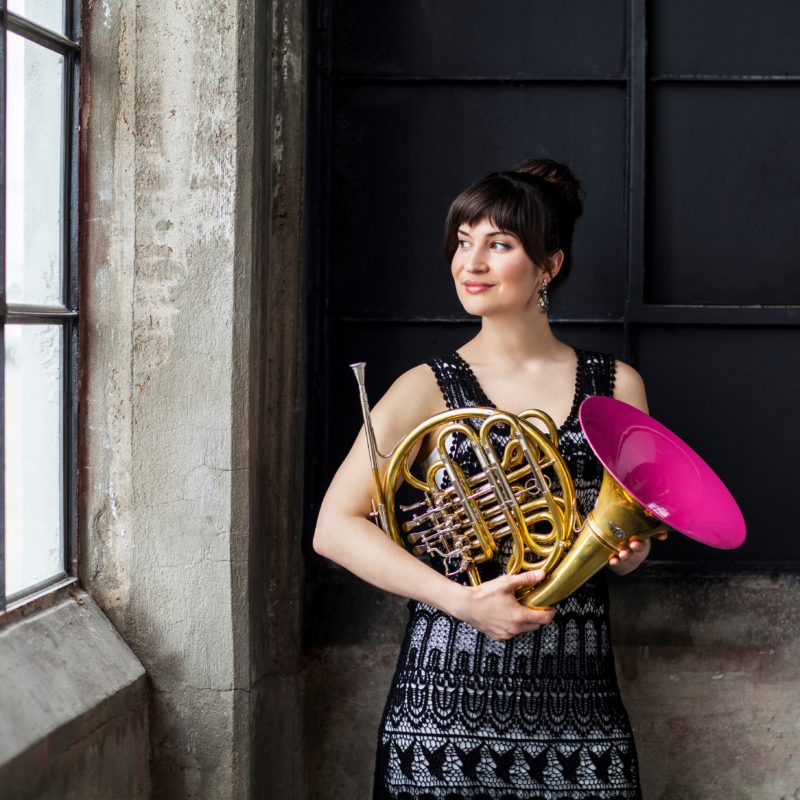
Ahead of Saturday’s ROCO Unchambered, we had a chance to chat with principal hornist Danielle Kuhlmann about her program, and the colorful threads of her musical story it unravels.
Discover the family ties which inspired her career, and the tapestry of music that has shaped her life – in this ROCOInsider!
What has excited you most about putting together this recital? When did planning begin?
Last spring when I learned the season’s theme would be “Coming of Age” – I absolutely loved the idea and the thought of being able to tell my musical autobiography through programming. Solo recitals are not something I do too often, and this offers a great chance to really give the audience a very personal experience with the horn. I’m also looking forward to performing these exciting and challenging works – I feel the audience will really get to know me through the program, and I can’t wait to share this music with them!
Were there any pieces that came to mind first, that you knew you had to include?
Definitely! My very first thought to include was the Herzogenberg Horn Trio because I’ve been playing that piece with my family since I was young – my mom plays the oboe, and my stepdad plays the piano, so we would play it around the house together for fun. That piece, and those memories of music-making, are really an important part of my musical story, and I was thrilled for the chance to play it with my ROCO colleagues.
Heinrich von Herzogenberg is a composer’s name that may not be as familiar to us – tell us about him, and the piece?
Herzogenberg was a contemporary of Brahms and a big fan of his, they even had correspondence – so the writing definitely shows his influence. Brahms’ Horn Trio is considered a classic piece of chamber music for horn, I feel it’s one of the best pieces ever written, and Herzogenberg structures his movements and melodies in a similar way. It’s really a wonderful piece, just adorable, and simply a blast to play.
Take us through the other program works – how do they relate to your musical story?
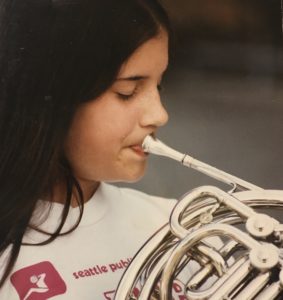
As a young hornist
Mozart’s Romanze (which is the second movement of his 3rd Horn Concerto) – I knew just had to be on here, because it’s one of the first “real” pieces of music I played on the horn, and it commonly is for young horn players. I teach it often to my students, it’s such a beautiful piece. I really enjoy playing it again now as a professional, I even played in my graduation recital from Juilliard, and it’s so filled with nostalgia and great memories for me.
Nostalgia is also why I’m including the traditional tune “Greensleeves”, because that’s my first clear memory of learning a piece on the horn, and I remember clearly how the highest notes in the melody were tough then (which are not even high, they’re mid-range now!)
Switching gears a bit, I’ll also be playing a gorgeous song which I arranged for horn duet – “Issues” by Julia Michaels, which is a nod to the pop horn group I co-founded and perform with, Genghis Barbie. The melody is so beautiful and evocative, as I soon as I heard it, I knew I had to play it on the horn.
There will also be a couple of brand-new works in the program as well. We’ll play a premiere by Jim Stephenson, whose music I’ve played often, and is always a ton of fun. I’ll also be performing (finally!) a tough work my brother Evan wrote for me years ago, his “Sonata for Horn and Piano” – dedicated to my mentor and teacher Alice Render.
What a great family connection! Did you grow up playing music with your brother?
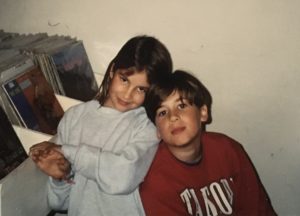
Danielle and Evan, in their father’s record store!
Oh yes – we started playing when we were really young, I believe he was 4 years old when he started on piano, and I started on violin soon after learning the Suzuki Method. I learned to read music before I could read words! Music was a huge part of our household – my father was a rock drummer, and my mother also a musician, plus all of our extended family also plays music.
Growing up, I pretty much followed my brother in whatever he did – and what he did was exceptional, so he was a great role model! I basically credit my whole career to him. Growing up in Seattle, we had a lot of musical opportunities – we were part of an incredible music program at Garfield High School, where I was in orchestra and actually jazz choir too. We both performed in the Seattle Symphony Youth Orchestra and their Concerto Competition, and then also both attended the Marrowstone Music Festival, where I met my mentor Alice Render.
My brother Evan, who plays contrabassoon in the Los Angeles Philharmonic and composes, was inspired to write the Sonata in tribute to Alice after we learned she had been diagnosed with breast cancer. She passed away in 2011, and she was such an amazing teacher who made an impact on everyone’s lives she touched.
How did studying with Alice impact you personally as a musician?
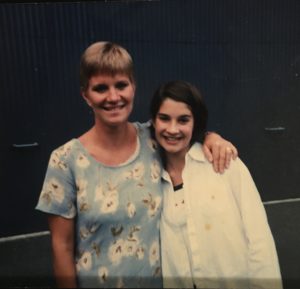
With Alice Render at Marrowstone
I began attending Marrowstone the summer after 7th grade – and the experience was such an inspiration, it was that year I really decided that I was going to pursue a career as a musician.
I have such special memories of my time there, hanging out with Alice and her husband, hornist Dale Clevenger – seeing their passion for playing the horn, their relationship with the music, and love for what they were doing – I’m 100% certain that was the catalyst for me becoming a professional horn player.
For me, being a young female hornist, seeing someone so vibrant and talented, so dedicated to her craft – it was incredibly impactful. She was also an inspiration for me to explore playing low horn, she emphasized the value in those inner parts, and the value of being able to play not just high beautifully, but also low. I wish she could have known I ended up playing 4th horn now (in the Seattle Symphony!)
She was such an important part of my development, and I still think about her a lot when I’m performing. I can picture her now smiling back there, enjoying the music, when I’d see her performing with the Chicago Symphony, even during her cancer treatment. I learned so much about what it means to be a professional musician, about strength, and about truly loving the music – from her.
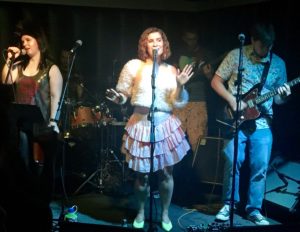
One of Danielle’s favorite pastimes!
You’ll follow the Sonata with the touching song “Smile”, written by Charlie Chaplin – with an unexpected twist?
This is one of my favorite tunes, my friend Adam Wolf of the Rock Horn Project did the arrangement for this – and it features vocals! So I’m excited to do a little singing.
Singing has been such a big part of my musical life and development, helping me stay “vocally” connected to the instrument. For me, playing the horn really feels the same as singing – it’s like singing through the horn!
You’re so musically well-rounded – how do you feel that’s helped you as a classical orchestral musician?
I think that exposure and experience with different kinds of music and artists have really given me a much broader inspiration to draw from in my playing and interpretation. Obviously, it’s helped inspire my horn quartet, Genghis Barbie, which came out of all of us wanting to have more variety in our performing lives. We laugh that even when we’re playing Lady Gaga – it actually helps inform how we’d play, for example, a Mahler symphony because it just gives you that different connection to the instrument and the music!
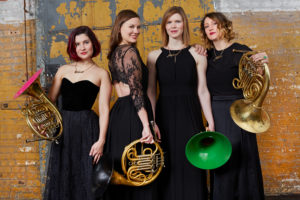
Genghis Barbie! Credit: Claudia Paul Photography
The musical work I get to do in the community as well has been tremendously helpful in reconnecting with the true purpose of music, and what it’s capable of. I’ve traveled to do cultural diplomacy work with the group Cultures in Harmony in the Philippines, and there was one trip in particular that really stuck with me.
We had been working closely with an indigenous tribe, over the course of a couple of weeks just spending time with one another, building musical relationships, culminating in a joint performance. It was so, so beautiful.
Returning from that trip, I’d travel again straight to do a major audition, which I had been practicing like mad for, woodshedding audition excerpts, stressing over. On that flight, I felt this understanding of the real power of music – after these two weeks in a totally different world, sharing this visceral musical experience together.
It really changed my mindset when I went to audition – my head was still in that great space. I won the audition, and I think that was a huge part of why it ended up being successful for me.
I think these experiences are so important, especially for classical musicians, because it’s so easy to get trapped in our box and lose touch with that real essence of what music is capable of. For me, these journeys outside of the stage keep me grounded and on track not just as a musician, but as a human being.
Hear Danielle, joined by her fellow ROCO musicians – in ROCO Unchambered: Unraveled, Saturday, February 22, 2020, 5:00 pm, at MATCH. Tickets available online at MATCH, or at the door.

Leave A Reply